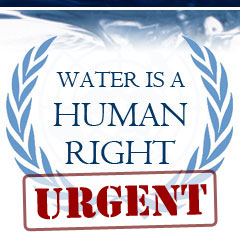 New York, July 23 2010 — This week marks an historic moment: a UN General Assembly Resolution titled “The Human Right to Water and Sanitation”, co-sponsored by at least 23 Member States of the United Nations and presented by the government of Bolivia, will be voted on Wednesday, July 28th.
New York, July 23 2010 — This week marks an historic moment: a UN General Assembly Resolution titled “The Human Right to Water and Sanitation”, co-sponsored by at least 23 Member States of the United Nations and presented by the government of Bolivia, will be voted on Wednesday, July 28th.
“This is the first time the General Assembly has been asked directly to deal with this issue and presents a huge test for the world,” says Maude Barlow, who served as Senior Advisor on Water to the 63rd President of the UN General Assembly.
Gender and Water
The right and access to clean water is intrinsically linked to gender equality. In many cultures, women and girls are responsible for collecting water for cooking, cleaning, drinking, hygiene, and growing food. However, decisions made about water and sanitation services continue to neglect gendered needs and concerns – largely because women are regularly left out of those policy-making spheres.
Women often have to travel long distances to collect water for their communities. Studies show that women in developing countries on average carry 20 litres of water per day over 6 km. This adds an incredible burden to women, particularly limiting the amount of time they have to spend on education. Traveling to collect water, often to remote areas, also puts women at risk for physical and sexual violence, along with added strains on their physical health.
Climate change and biodiversity loss have caused huge changes in our water resources with increased droughts and floods, while at the same time reducing water access and quality. This has put further stress on women’s role as resource managers and increased the time devoted to collecting and managing water.
Importantly though, women have shown strong leadership both in terms of advocacy towards the protection and conservation of natural resources as well as innovation in the water sector. For example, in India, the Self-Employed Women’s Association (SEWA), a trade union of 250,000 poor self-employed women, launched a ten year campaign to revive water sources in drought prone districts of Gujarat, India which resulted in better irrigation for drinking water and decreased soil salinity.
ACT NOW
For the first time since the Universal Declaration of Human Rights was adopted 60 years ago, the UN General Assembly is finally poised to recognize the Human Right to Water and Sanitation.
To mark this event, international and community groups are kicking off a Global Week of Action for the Human Right to Water and Sanitation from July 21st until the historic vote on July 28th. Actions include: sign an open statement from elected representatives in support of the human right to water and sanitation, send letters directly to UN missions, and, perhaps most importantly, contact your government to urge them to support this historic Resolution.
To find resources for all the above action items and to get more information on how you can help, WEDO urges to you visit the website of our partner, Blue Planet Project
About Blue Planet Project
The Blue Planet Project is an international civil society movement begun by The Council of Canadians to protect the world’s fresh water from the growing threats of trade and privatization.
They work with organizations and activists in both South and North, and are affiliated with international networks including Friends of the Earth International, Red Vida (the Americas Network on the Right to Water) and the People’s Health Movement.


